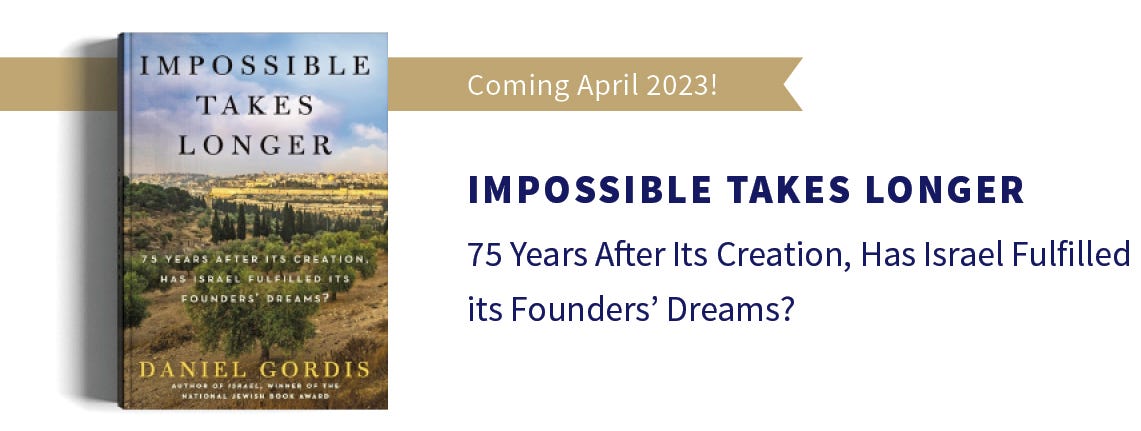

Discover more from Israel from the Inside with Daniel Gordis
"The Israel We Knew" is not gone ...
But Israelis never wanted that "Israel we thought we knew": An indirect reply to Thomas Friedman
On Israel-interested social media, complaining about Tom Friedman’s columns in the New York Times has become something of a sport. I’m neither a fan of nor a participant in the sport. I like Tom Friedman, and on many issues, I find him thoughtful and deeply informative. On Israel, I often disagree, but that’s life. When he and I are in dialogue, I find him menschy and interesting, and I try to be the same.
For when you have the time, here’s a conversation between us:
So it is with some hesitation that I respond, however indirectly, to Friedman’s recent Op-Ed in the NYT, in which he argued, post Israel’s elections, that “the Israel we knew is gone.” I’ve got no interest in joining the “jump on Tom Friedman fray.” That said, I don’t think it’s gone at all.
Neither, apparently, does Dennis Ross:

Rather than a line-by-line commentary on Friedman’s piece, I’ll make just five prime points.
Point #1: American Jews want a tepid Israel; most Israelis have never wanted that, and don’t care about the discomfort of those who do
Here’s the heart of the problem. There are many people around the world who want Israel to be something it does not wish to be. They want it to be successful, but humble. They want it to be strong and secure, but still desperate for foreign support of all sorts. They want it to be Jewish, but in a “nice” kind of way. Israeli dancing (which I haven’t seen here in years), flags at the right time, a country filled with “Hatikva moments” as some call them. A country traditional enough to be heartwarming, but not so traditional that it would dare imply that less intense forms of Jewish life cannot make it. A country steeped in memory, but also one that is finally willing to move on.
An Israel moderate in every way would be an Israel easy to love. It would be a source of pride, but not a source of shame. It would be an Israel that would make us feel great as Americans and as Jews.
The only problem is that that Israel doesn’t exist, and it never has. Of course, there’s also never been an America like that, or an England like that. But Israel is somehow expected to hover above the messiness of history, above the sort of ugliness that statehood always brings with it. The early Zionists knew that statehood would be messy. That, in fact, is precisely why Ahad Ha’am strongly opposed it. Let’s build a cultural center here, he said. We’ll study and learn and write and create. And we’ll leave the ruling to other people.
Right, said Herzl and Ben-Gurion among many others. We’ll study and learn and write and create. And we’ll be dead.
Being dead is not high on Israel’s list. Tom Friedman has famously called Israel “Yad Vashem with an air force1,” a dig I’ve never really understood (or liked). “Holocaust memory with the power to make sure it doesn’t happen again.” What’s wrong with that? Too much memory? Too much power? True, it doesn’t make Israel always lovable … it just gives it meaning and the ability to survive.
Point #2: How the Left and Center gave Smotrich and Ben-Gvir lots of ammo
Yes, Bezalel Smotrich and Itamar Ben-Gvir are highly unsavory characters, to put matters very mildly. As of this writing (Sunday evening), there are reports that they may attend the annual memorial ceremony for Meir Kahane. If that’s true, it is genuinely cringe-worthy and intentionally provocative. Smotrich used the occasion of the Yitzchak Rabin Memorial at the Knesset to attack the Shin Bet and to argue that it was they—and not the Israeli religious right, commonly seen as somehow complicit—who encouraged the murder. That’s a long-simmering debate in Israel in some circles, but raising the issue today in the Knesset was beyond tasteless. We have to safeguard the Supreme Court, and lots more.
No, Smotrich and Ben-Gvir are not going to provide us with the moderate, gently-liberal-but-still-Jewish Israel that so many people (including me, in my more ethereal moments) want. I’m disappointed (but not at all surprised) by the results of this election. I didn’t vote for a party that will likely be in the coalition, and I know that the coming months and years will include days when I’ll want to bang my head against the wall.
That’s what happens in a democracy when you lose an election. And though the party that I voted for “lost,” I’m thrilled that though this was the fifth election in a tortuous cycle of campaigns that lasted more than three years, more Israelis turned out to vote this time than they have in many, many years. Israelis are tired, but not disengaged.
Note, also, that it was a fair election. Who’s saying it was rigged? Anyone saying the election was stolen? Have any players said that they won’t relinquish power?
No one. No one at all. A country that was built primarily on a foundation of people who came from non-democratic countries has built a democracy that hasn’t sputtered.
I can think of some other countries that would be much better off if their democracy was as stable as ours.
Ah, some will say, true, the machinery of democracy worked fine, but look at who you’ve become! Racists. Hyper-nationalists. Religious crackpots.
Some of the people who voted for them probably are racists, hyper-nationalists and religious crackpots. But most are not. So why did they vote for them?
Let’s start with Meretz. On the night of the elections, in the waning hours of voting and then in the first hours after the polls closed, Meretz supporters gathered at their headquarters, believing that they still had a shot at getting into the Knesset. But it was going to be a long night, and they weren’t going to wait around. So it was time to disperse. And before they did, they sang. What did they sing? Hatikvah? No. They sang a Hebrew version of the Internationale.
That is why they are no longer in the Knesset. Because that kind of socialist/communist universalism, out of style in almost all of the world, is finally running out of steam here, too.
“Labor and Meretz won a combined 44% of the vote in 1992, the year Yitzhak Rabin was elected and launched the peace process with the Palestinians. That number fell to 34% in 1996, ushering in Netanyahu’s first term in power… It hit 28% in 1999, 20% in 2003 following the suicide bombing wave of the Second Intifada, 19% in 2006 and 13% in 2009.”
Ask any one of those people what their vision for the Jewishness of the state is, and all they will tell you is what they do not want. They do not want religious coercion. They do not want a corrupt rabbinate. Fair enough. Most religious Israelis don’t want those, either.
But what Jewish content do they think should be taught in public schools? Find me a statement from a left-leaning Jewish party about that. In what ways should Jewish law (halakhah) color rulings of the Supreme Court (Justice Haim Cohen was the notable example of a magisterial weaving of the two systems)? Who talks about that? And what about the fact (to which we will return) that the country is losing control of the south of the country to Bedouin and Arab violence? Next issue, they’ll say.
Now, imagine that you’re at the poll. You’re either religious, or you’re not. But you care about the Jewishness of the country. You want to vote for someone who doesn’t sing the Internationale, but instead, speaks about a Jewish state, a Jewish tradition, a Jewish home and homeland. Someone who will be (as was Menachem Begin) the Jewish soul in the room. And you don’t want to vote for the ultra-Orthodox, who actually do favor some forms of religious coercion.
Who were your choices? Not Bibi—he never talks about it. Not Lieberman—he’s built a career on hating the religious. Not even Lapid, who though he does care deeply about Judaism, never articulates a vision for Israel as a Jewish state (see our column about Lapid’s campaign). Not Gantz, who though actually somewhat religiously traditional, also never talks about it. Bennett used to be that, but he’s gone. So what were your choices? There was only one—Smotrich and Ben-Gvir.
No less than 49,037 people voted for Ayelet Shaked, once Bennett’s right hand person, who had exactly zero chance of getting into the Knesset. Why did 50,000 people waste their vote? Because they were protesting—they wanted to be able to vote for someone who speaks about the Jewishness of the state, and felt robbed that there was no one savory around. So they voted for her as if she had a shot, and made their point.
Part of this seeming swing to the right is Bibi’s fault, for letting Smotrich and Ben-Gvir into the coalition fold (Bibi will now stop at nothing to stay out of jail). But much of the responsibility lies with the Left and even the Center, who have abdicated any meaningful form of Jewish discourse. What has that Jewish vacuousness gotten us? It’s gotten us a slice of the young generation of Israelis who can no longer articulate why they’re here—and the lives they live reflect that.
In my Israel: A Concise History of a Nation Reborn, I noted how over time, the wellspring of Zionist and Israeli devotion has moved from the secular left to the religious right—as reflected, sadly, even in army casualties (page 391):
In the conflicts, as casualties mounted, Israelis took note of an additional change in their society. If in the 1960s it had been the kibbutzim that had produced officers—and suffered casualties—at rates disproportionate to their percentage of the population, it was now the national religious community that had taken on that role. By 2010, though the national religious community represented no more than 10 percent of Israel’s population, they made up some 25 to 30 percent of soldiers in combat units. Similarly, there had been a dramatic increase in the percentage of graduates of the officers’ training course who were from the religious community; that rate had risen from a mere 2.5 percent in 1990 to 26 percent in 2008.
This election just reflects that.
Point #3: Many Israelis feel they’re losing control of the country
A bit more than a year ago, Israeli Jews and Arabs went to virtual war in the streets of our cities. No one less than President Rivlin called it a pogrom:

Interestingly, post-election stats show that the Arabs from those cities where the rioting took place overwhelmingly voted Balad, an Arab party that endorses terrorism and is opposed to Israel being a Jewish state. Interestingly, how did the Jews in those cities vote? … Yup, you guessed it. Smotrich and Ben-Gvir.
A related phenomenon is covered by a recent book, Bedouistan, which is making waves in Israeli life. I haven’t yet read it so can’t vouch for its accuracy. But the fact that the book is a phenom tells you something. Israelis are watching the country erode, its leadership being so conscious of how it’s perceived outside that it cannot maintain control of even internal territory.
Many of the Israelis who voted for Smotrich and Ben-Gvir voted not for the antics and not for the cringe-worthy moments that are sure to follow. They voted for them because Ben-Gvir, actually more than Smotrich, is arguing that it’s time to take the country back.
Here’s Ben-Gvir’s tweet of his own sign, which reads, “Whose country is this? It’s about time—Ben-Gvir.”
Tom Friedman writes that “Netanyahu has been propelled into power by bedfellows who see Israeli Arab citizens as a fifth column who can’t be trusted,” intimating that Israeli Arabs are not a fifth column. Some are, some aren’t. In our podcast series, I’ve interviewed many Arab women and men who are quite the opposite. But if you live in the Negev, if you have farmland you can’t protect from Arabs in the south or the north, you’re fearful. If you’re a young Jewish Israeli woman afraid to walk in downtown Beer Sheva, you don’t think a “fifth column” is a ludicrous claim.
Ben-Gvir knows that. Friedman can dismiss it, but Israelis increasingly don’t. The left and center ignore the issue, and now, Israelis are ignoring them.
Point #4: We have got to stop this Trump-Bibi comparison
Friedman begins his column with a doomsday scenario for the United States:
Imagine you woke up after the 2024 U.S. presidential election and found that Donald Trump had been re-elected and chose Rudy Giuliani for attorney general, Michael Flynn for defense secretary, Steve Bannon for commerce secretary, evangelical leader James Dobson for education secretary, Proud Boys former leader Enrique Tarrio for homeland security head and Marjorie Taylor Greene for the White House spokeswoman.
What’s that got to do with Israel? “The coalition that Likud leader Bibi Netanyahu is riding back into power is the Israeli equivalent of the nightmare U.S. cabinet I imagined above. Only it is real ….”
Drawing the Trump-Bibi parallel is a quick way of evoking among the vast majority of his readers a sense that if Israel elects Bibi, Israel is lost (“the Israel we knew is gone”). (I never comment on American politics in these columns. Never.) But despite Bibi’s intention to weaken the judiciary, his use of over-the-top toxic election rhetoric that corrodes Israeli society, his having given his imprimatur to Smotrich and Ben-Gvir and the fact that his intersections with truth seem coincidental at best (even Smotrich has been recorded calling Bibi “the liar of all liars”), Trump and Netanyahu are two very different animals.
It’s not that there are no similarities, it’s that the differences are far more basic. I’ll let Bibi speak for himself. Here is an English rendition of a podcast interview that Bibi gave to Israeli journalist Gadi Taub about a year ago. You don’t need to read the whole thing, though it’s highly worthwhile. Just read some and ask yourself if this eloquent, well-read, highly educated and nuanced observer of history reminds you of Donald Trump.
The inability of the Jews to identify the danger is a chronic problem that works against us. A chronic problem to our detriment. You know, my father wrote a book on Don Isaac Abarbanel, [Don Isaac Abarbanel: Statesman and Philosopher], who was the great leader of Spanish Jewry and also the finance minister in Portugal. He was a great genius, without a doubt. He wrote in 1492, a few months before the expulsion from Spain: “The situation of Spanish Jewry has never been better.”
The ability to identify danger in time is a prerequisite for the survival of any living organism. And this organism can be a small fly, who suddenly sees a threatening shadow and flees, or a nation of human beings. The Jews lost the ability to spot danger in time.
Bibi is articulate and smart. He’s a voracious reader of history (and much more). He thinks (and I agree) that Diaspora life often tends to foster an inability to see danger in time. He’s both a rough-and-tumble (ruthless) politician, and a genuine intellectual.
Iran, Bibi reminds us, is out there. So yes, he says (and Israelis tend to agree), we need to remember that the world folds its arms when people seek to destroy us. So yes, we need to be able to defend ourselves. So yes, we can live with being told we’re “Yad Vashem with an air force,” because no, we can’t survive any other way.
You won’t finish reading that interview thinking that Bibi is honest. You won’t finish it approving of his meddling in American politics. You won’t finish it admiring his decision to embrace Smotrich and Ben-Gvir. But you will finish it impressed by his articulateness, struck by his profound read of history, admiring of how much he has thought about the nuances of Jewish life over the centuries. (You’ll also learn a lot of history.)
And when you’re done, it will be clear—it’s time to drop the analogies. Whatever happened in Israel this week, it’s not a parallel of what’s happening in the United States.
Point #5: If you know Israeli history, you stop trying to predict it
I’m not much happier than is Tom Friedman about the results of these elections (and I actually have to live with them). But I don’t have the certainty that he does that things are going to be horrible. Here’s how he closes his column:
I have reported from Israel for this newspaper for nearly 40 years, often traveling around with my dear friend Nahum Barnea, one of the most respected, sober, balanced, careful journalists in the country. To hear him say to me minutes ago on the phone that “we have a different kind of Israel now” tells me we are truly entering a dark tunnel.
“We are truly entering a dark tunnel”? (I’m not the Barnea fan that Friedman is.) For sure? Think of all we were once certain about, that played out entirely differently from our expectations, fears or hopes:
In the early 1950s, Israel was about to go bankrupt. It had no cash, no way of housing or feeding all the immigrants who were pouring into the new country until it got bailed out. By whom? By the Germans, who merely eight years earlier had been slaughtering the Jews in death camps across Europe.
In May 1967, as Nasser was predicting that he would drive Israel into the sea, some Israelis left, leading to the black humor quip, “the last one out of the airport, turn off the lights.” Most didn’t leave, but were terrified. And then, in Six Days, Israel tripled its sized, destroying the armies of Egypt, Jordan and Syria.
In the first days of the Yom Kippur War, all seemed lost. Golda Meir, then the Prime Minister, had to stop Moshe Dayan from going on the radio to talk about the “destruction of the third Temple.” A few weeks later, Israel had surrounded Egypt’s Third Army, and was on the march to Cairo and Damascus.
In 1977, Israelis elected a man commonly called a “terrorist” as Prime Minister. TIME Magazine wrote, in an article titled “Kind … Honest … Dangerous,” that Menachem Begin was a demagogue and a violent rebel, referring to his responsibility for Deir Yassin, the fatalities of the King David bombing, the two hanged British sergeants, the Altalena, and his three-month suspension from the Knesset during the reparations debate. It ended just as negatively as it started: “‘Begin’s private life is as clean as a pin,’ says a Western diplomat. ‘Everything they say about him is true. He’s kind, honest and quite likable. But that doesn’t mean he isn’t dangerous.’” A few weeks later, Sadat came to Israel. Two years later, Israel had peace with Egypt and Begin got the Nobel Peace Prize.
In 1993, the world celebrated as Bill Clinton, Yitzchak Rabin and Yasser Arafat shook hands on the White House Lawn, signing the Oslo Accords, signaling a supposed beginning to the end of the Israeli-Palestinian conflict. Nobel Peace Prizes were distributed again. How did that work out?
In 2014, when Israel was at war with Hamas, John Kerry tried to force Israel to accept Hamas’ absurd terms for a cease-fire (David Horovitz wrote about Kerry’s “betrayal” of Israel), while it was Egypt that stood staunchly at Israel’s side. In 1973, if you’d told someone that the day would come when Israel would be at war and Egypt would be Israel’s most steadfast ally, they would have questioned your sanity.
I thought of the very same John Kerry once again just last week, as I was on an El Al plane over Saudi Arabia on my way to Dubai and Abu Dhabi, Israeli passport in hand. And I couldn’t but help chuckle out loud when I remembered his self-satisfied, entirely confident warning in 2016:
Which brings us back to Tom Friedman. “We are truly entering a dark tunnel”? Maybe, I don’t know. No one knows.
Here’s what I do know. Very little about this place plays out as we expect. But after centuries of Jewish history that have proven beyond a shadow of a doubt that the Jews need a place to call their own, the one thing that we give up by virtue of being a member of the Jewish people is the right to despair. The right to despair is simply one we do not have.
We can (and should) be worried. We can be disappointed. We can grimace. But we cannot give up. Even if Friedman is right that this could be a tunnel, tunnels also have exits. That’s what makes them tunnels.
There’s an exit. Because a viable Jewish people without a Jewish state is utterly unthinkable, this is not the moment for despair. Instead, we need to work to understand why what happened happened, and then, together, find our way to the light on the other side.
Is freedom of religion in Israel really in danger? How worried should we be?
We spoke with Shlomit Ravitzky Tor-Paz, of the Israel Democracy Institute, who is no fan of this new government, but who has great faith in the force of rank and file Israelis who are building networks between different sorts of Jews. She reminds us that most Likud voters are secular, and that now that the elections are over, Likud MKs will be forced to put the bombast behind them and govern. And even Smotrich and Ben-Gvir, she thinks, may surprise us.
Our interview with Shlomit Ravitzky Tor-Paz will be posted on Wednesday, with a transcript, for paid subscribers to Israel from the Inside.
Our twitter feed is here; feel free to join there, too.
Thomas Friedman, From Beirut to Jerusalem, page 280.
Subscribe to Israel from the Inside with Daniel Gordis
Israel from the Inside is for people who want to understand Israel with nuance, who believe that Israel is neither hopelessly flawed and illegitimate, nor beyond critique. If thoughtful analysis of Israel and its people interests you, welcome!





















I love Daniel Gordis! As an American-born Israeli Jew, I love the way he articulates our side, with such moderation, rationality, knowledge of history, and love of Judaism. I have the last three, but could never muster the moderation that enables Daniel to respect his opponents and speak to them, rather than shout at them. I voted differently than Daniel, but in essence he represents me. Is there any way to get Thomas Friedman to read this article?
Thank you for your nuanced yet strong and convincing pushback regarding Mr. Friedman’s predictable and ahistorical NYT column.